Lingering inflation is changing how most Americans plan to cool their homes this summer, new study shows
Survey findings from DuraPlas reveal that 77% of people say higher prices are causing them to use more alternatives to their HVAC systems as the temperatures begin to rise on an expected warmer-than-normal summer
Purpose of this Study
With temperatures expected to be unusually warm this summer and inflation proving to be stickier than most experts expected, the DuraPlas team wondered if that increased spending in other areas would impact how average Americans planned to cool their homes. We completed a survey at the beginning of June 2023 to ask, timed to take advantage of the impending start of summer and the release of most students from school.
The survey found that most Americans, while still keeping their homes at a relatively cool average temperature of 70 degrees this summer, will be deploying some alternative methods of keeping their homes comfortable.
- More than 45% said they’d be keeping blinds and curtains closed.
- Nearly 40% said they’d be using ceiling fans more this summer.
- More than 30% said they’d be keeping their windows open at night.
What is worrying, though, is the broad lack of understanding of how HVAC systems work, the role each of the components plays, and the lack of regular maintenance that could leave many of these systems vulnerable to failure at a time of year when they are needed the most.
“What this survey tells us is that while Americans are willing to explore alternatives to cooling their home, they are still incredibly reliant on their HVAC systems to keep them comfortable,” DuraPlas President Paul Phillips said. “But those systems could be quietly at risk just when people need them the most because homeowners aren’t performing the proper maintenance needed to keep each of the components working like they are supposed to.”
Working with the third-party survey platform Pollfish, we asked 1,000 U.S. adults on June 2, 2023, to share how they were planning to cool their homes this summer, what kind of preventative care they did to keep their systems in working order, and then what their relationship to HVAC service companies and technicians looked like. Here are the results of our summer cooling survey.
KEY FINDINGS:
- While most say they will keep their home a cool 70 degrees, more than 75% said that, thanks to inflation, they are changing how they plan to beat the summer heat.
- Most homeowners are skipping recommended preventative maintenance, which could leave them vulnerable when they need these systems the most.
- The most important relationship in the HVAC industry isn’t between the service company and the customer but between the customer and the technician.
While most say they will keep their home a cool 70 degrees, more than 75% said that, thanks to inflation, they are changing how they plan to beat the summer heat.
We surveyed people from across the country, and wherever they lived—Northeast, Midwest, South, or West—most said that no matter how warm it got outside, it was going to be 70 degrees inside of their homes.
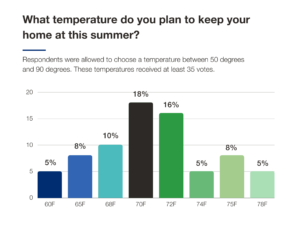
That said, 77% of people said inflation is changing how they plan on cooling their homes this summer, including 20% who said they are planning on keeping the temperatures slightly warmer inside.
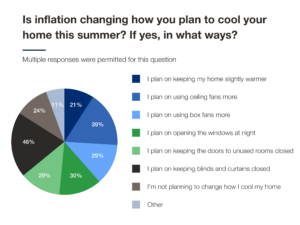
We did see some differences in those alternative cooling strategies based on where the respondent lived. Almost twice as many people, maybe not surprisingly, living in the western and northeastern parts of the U.S. said they planned to open the windows at night as opposed to those living in the south or midwest, 37.8% compared to 22.8%.
Most homeowners are skipping recommended preventative HVAC system maintenance, which could leave them vulnerable when they need these systems the most.
Roughly one in three homeowners admitted to having concerns about the health of their HVAC system, and 15% say they haven’t even thought about whether or not their system will survive the summer.
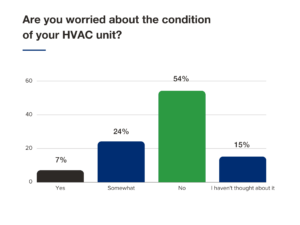
Maybe more of them should be worried, though, since hardly anyone said they were regularly completing the kind of preventative maintenance that can extend the life of an HVAC system. While most homeowners say they do take measures to reduce stress on their HVAC systems, such as changing air filters, using fans, and closing blinds, very few individuals follow the best practices recommended by HVAC professionals to maintain system health. Only 30% of homeowners schedule preventative maintenance, while a mere 27% regularly clean their outdoor condensing unit, and only 23% consistently check blades and belts.
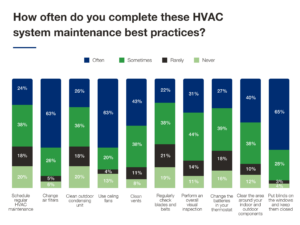
The most important relationship in the HVAC industry isn’t between the service company and the customer but between the customer and the technician.
Homeowners admit that HVAC systems are still a bit of a mystery for them. Most don’t know how big their own systems are. They don’t understand industry terminology, and they, at their very best, have only a broad knowledge of how their HVAC systems work.
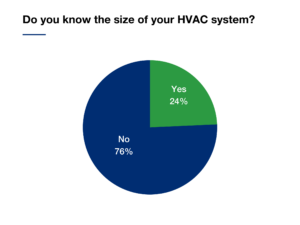
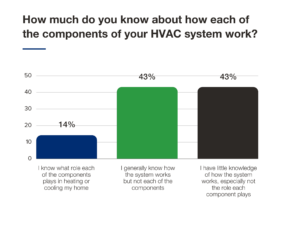
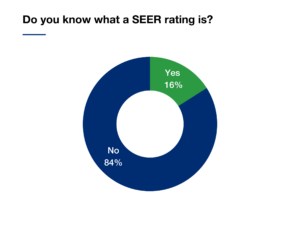
That means when it comes time for repairs or replacement, they are at the mercy of the service companies they call and the technicians who do the work.
What’s interesting is that while most of them say they aren’t loyal to either the service company or the technician, they do say that if they find a technician they trust, they’d be willing to follow that person to a new company if they changed jobs.
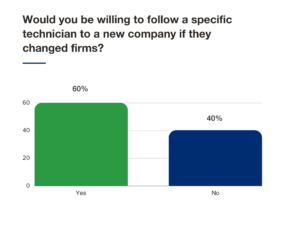
“HVAC systems are complex,” Phillips said. “Homeowners are reliant on technicians to steer them in the right direction when it comes to what they need and the parts they use. They trust that what these techs are recommending—from the pad the condenser sits on to the air handler in the attic—is going to be of the highest quality and properly sized for their home. And they are saying that finding a technician they like and can trust is like gold. They don’t want to let go.”

